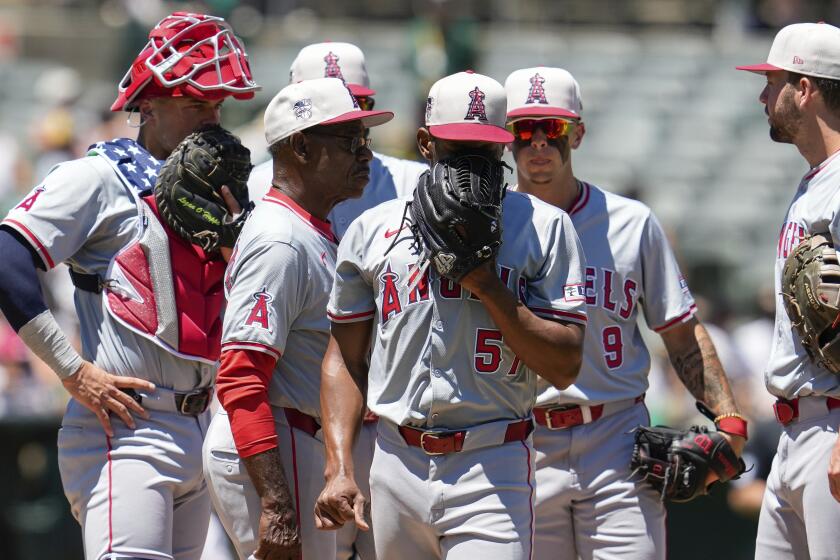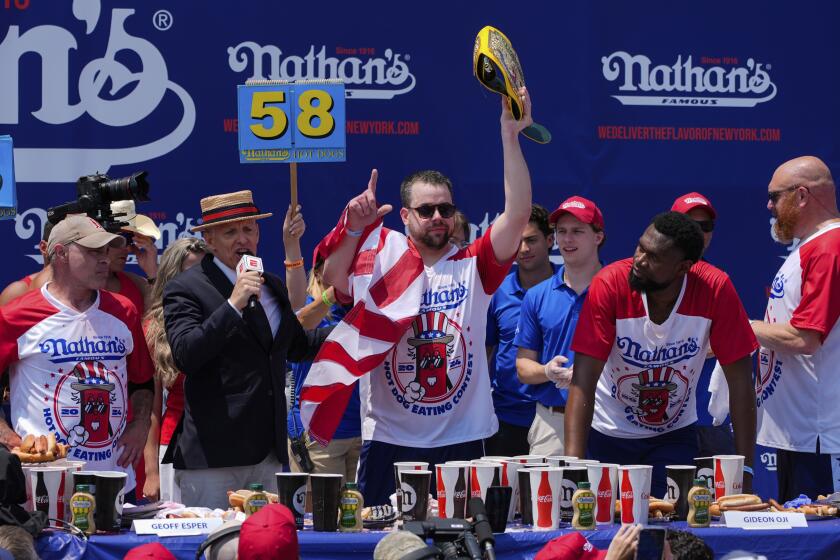ANALYSIS : Notre Dame’s Deal Shouldn’t Be a Shock
Indignation is doing a brisk business these days as the country’s big-time athletic directors line up to criticize Notre Dame’s decision to become a free agent and sell its 1991-95 home football games to the highest bidder.
Monday, the university signed a five-year deal with NBC worth about $40 million.
The landmark agreement leaves the College Football Assn. without its No. 1 draw, the box-office equivalent of “Casablanca” without Bogart. It also exposes how frail the union of 64--oops, 63--CFA member institutions can be when millions of dollars and precious television exposure are at stake.
The CFA finds its own five-year, $320-million combined deal with ABC and ESPN in jeopardy as the networks ponder the alternatives, which are few. They can pursue legal action against the renegade Fighting Irish or renegotiate their contracts with the Notre Dame-less--and thus less attractive--CFA.
Look for renegotiation and continued Notre Dame-bashing from the CFA’s more vocal members.
“I call it greed,” said Rudy Davalos, Houston’s athletic director.
Added Georgia’s Vince Dooley: “. . . Ultimate greed.”
Notre Dame would prefer to call it the ultimate business opportunity, a chance to add money to its endowment and further improve its visibility. Armed with the Notre Dame mystique, university administrators simply took advantage of the market demand, albeit clumsily.
“There’s not another school in the country that could have done it,” one network official said. “There are some who think they could, but they can’t. If they sat back and looked at it, they’d realize it.”
The evidence:
--Only three college football games received double-digit ratings last season, and each involved Notre Dame.
--A look at the ratings of ABC’s or CBS’ top four college football games in 1989 shows that Notre Dame played in each.
“Now, if that doesn’t tell me something, nothing will,” the network official said.
In short, NBC, in need of sports programming, purchased the most viable college product available. If there were a Q rating--TV’s recognition factor--for college football, Notre Dame would win easily.
According to Dick Rosenthal, Notre Dame’s athletic director, the university will apologize for nothing. Greed wasn’t the issue as much as exposure, he said.
Under the terms of the CFA’s new agreement with the networks, Notre Dame’s visibility could have been compromised by a viewing schedule that emphasized regional games. The fear among school officials was that the Fighting Irish would get heavy play in the Midwest but perhaps few appearances on the West or East coasts. For a private, independent school that considers itself a national institution, such possible constraints were considered unsatisfactory and, ultimately, unacceptable. Financial contributions would be threatened, a no-no at any university, Rosenthal argued.
“That’s what motivated us to act,” Rosenthal said.
Notre Dame played 13 games last season, 12 of which appeared in one form or another on national television. By signing with NBC, the school guarantees itself at least six national appearances a season with more to come when ABC, ESPN and the CFA rework their arrangement. After all, what network wouldn’t want to broadcast Notre Dame’s 1991 road schedule, which includes Michigan, Air Force and Penn State? The next year, the Fighting Irish visit Michigan State, Pittsburgh and USC, among others.
While it is difficult to argue with Notre Dame’s logic, it is easier to argue with its methods.
CFA members are outraged over what they consider a form of treason by one of their own, and, in a small way, they have a point.
While it is clear that Rosenthal never committed to the CFA television package, it is unclear why so many CFA members and officials, including CFA Executive Director Chuck Neinas, were so shocked by Notre Dame’s announcement. Rosenthal never signed a contract sent to him by the CFA that would have given the school’s consent to the ABC/ESPN deal. But it remains to be seen if Rosenthal expressed Notre Dame’s dissatisfaction to the CFA before the school negotiated its own arrangement with NBC. If he didn’t, CFA members have a reason to feel misled.
Said Rosenthal: “We clearly haven’t done anything wrong. We have the rights to our games. We were volunteer members of the CFA.”
Big Eight Commissioner Carl James has questioned the role of Father William Beauchamp, the Notre Dame executive vice president who was involved with the CFA’s television negotiating committee. Without accusing Beauchamp or Notre Dame of conflict of interest, James made it clear that the school’s participation in the negotiations was ironic, considering the school’s decision to essentially secede from the CFA.
Rosenthal said Beauchamp “acted very responsibly. His role was to try to aid in bringing what was the best television contract to the membership of the CFA.”
Rosenthal also said that most of the money earned from the NBC deal--$30 million for the 30 home games, about another $10 million in “additional rights fees,” said a source familiar with the negotiations--will go to the school’s student-aid endowment, not the athletic department. Also, the revenue of $1 million a game will be shared by Notre Dame and the visiting university.
So, the CFA was caught by surprise, but in retrospect, it shouldn’t have been. It was only a matter of time before a school such as Notre Dame, which attracts large national audiences, would strike its own deal. It happened in college basketball, where such conferences as the Big East and the Atlantic Coast Conference are reaping the riches of television money. It now is happening in college football, an inevitable development.
What probably irks the remaining 63 CFA member schools the most isn’t that Notre Dame is assured of big bucks and increased viewing time, but that they aren’t part of a similar package. To this end, there are rumors of further movement.
The University of Miami, the defending national champion, is reassessing its position with regard to the CFA contract, said Sam Jankovich, Miami’s athletic director. Like Notre Dame, it never officially agreed to the ABC/ESPN agreement. What is to stop Jankovich from approaching, say, CBS--as is rumored--and making a deal of his own? Last season, Miami earned about $2 million in regular-season television money. Contrast that with what Notre Dame will receive in 1991, and it’s easy to understand why high-profile programs such as Miami’s are reevaluating their monetary worth.
Free agency in college football has begun, in earnest. And despite the protests of the CFA, it will continue. Notre Dame merely took the first step on a trail that will be traveled by many.
Times staff writer Larry Stewart contributed to this story.
More to Read
Get our high school sports newsletter
Prep Rally is devoted to the SoCal high school sports experience, bringing you scores, stories and a behind-the-scenes look at what makes prep sports so popular.
You may occasionally receive promotional content from the Los Angeles Times.






